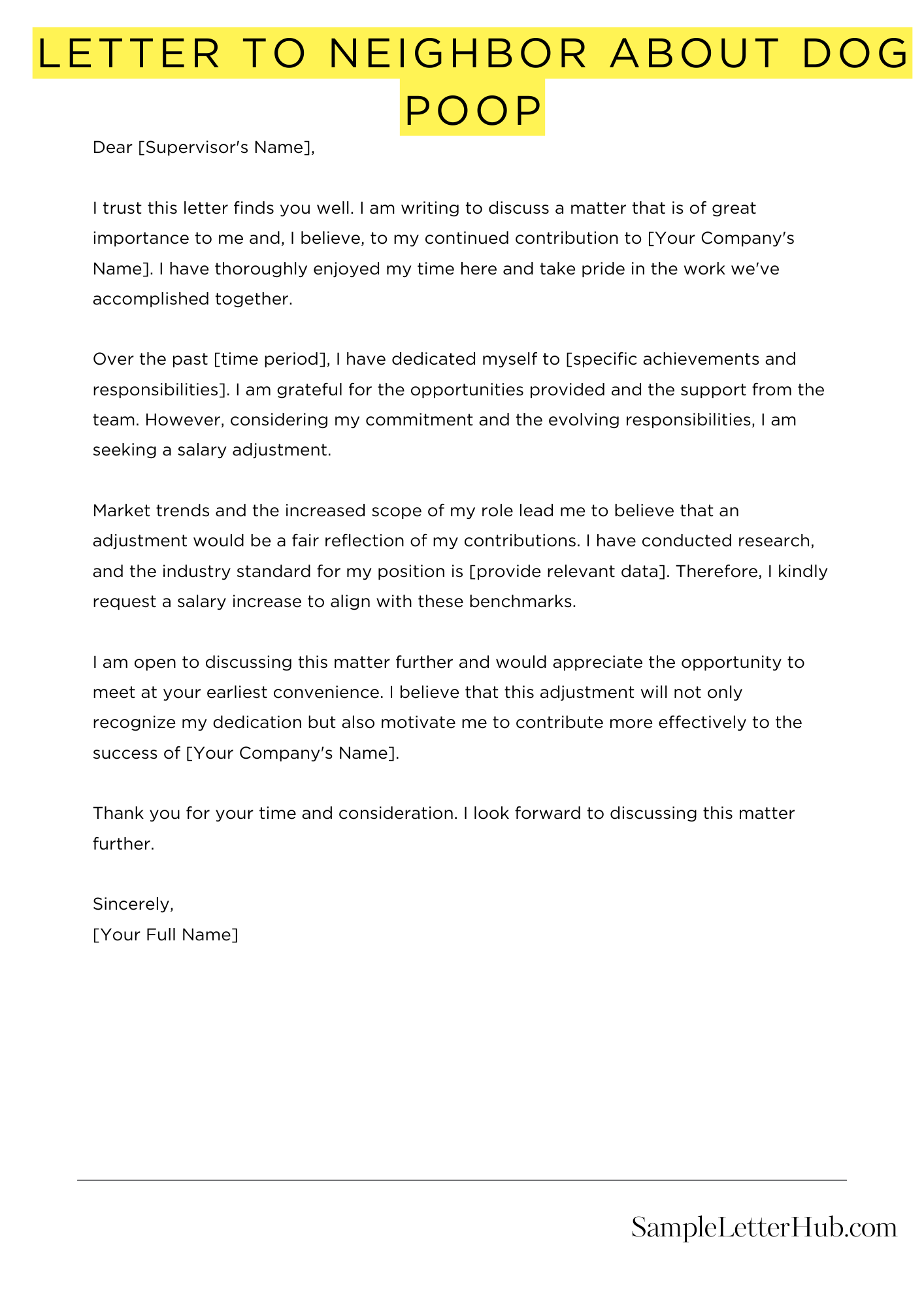Letter To Neighbor About Dog Poop is a letter that you write to your neighbor to address the issue of their dog’s poop on your property or in your neighborhood. It is a way to communicate your concerns and request that they take action to resolve the issue.
In this article, we will share templates/examples/samples of Letter To Neighbor About Dog Poop. These samples will provide you with a starting point for writing your own letter and will help you to communicate your concerns in a clear and concise way.
Letter to Neighbor About Dog Poop
Dear [Neighbor’s name],
I hope this letter finds you well. I’m writing to you today to discuss a matter that has been concerning me lately. I’ve noticed that there has been dog poop left on our shared lawn, and I’m concerned about the health and safety of our pets and children.
Dog poop can contain harmful bacteria and parasites that can be transmitted to humans and animals. It can also attract flies and other pests, which can be a nuisance. I’m sure you agree that it’s important to keep our neighborhood clean and safe for everyone.
I would appreciate it if you could please make sure that your dog’s poop is picked up and disposed of properly. There are several dog waste bags and trash cans located throughout the neighborhood, so it’s easy to do.
I understand that accidents happen, but I would ask that you be more diligent about cleaning up after your dog. If you see any dog poop on our shared lawn, please pick it up and throw it away.
Thank you for your understanding and cooperation. I’m confident that we can work together to keep our neighborhood clean and safe for everyone.
Sincerely,
[Your name]

How to Write Letter To Neighbor About Dog Poop
Writing a letter to your neighbor about dog poop can be a delicate task. You want to be polite and respectful, but you also need to be clear about your concerns. Here are a few tips on how to write a letter that will get your point across without causing unnecessary conflict.
1. Start with a friendly greeting
Begin your letter with a friendly greeting, such as “Dear [Neighbor’s Name].” This will help to set a positive tone for the letter.
2. State your purpose clearly
In the first paragraph, state your purpose for writing the letter. For example, you could say, “I’m writing to you today to discuss the issue of dog poop in our neighborhood.” Be specific about the problem you’re experiencing, such as finding dog poop in your yard or on the sidewalk.
3. Be polite and respectful
Even though you’re writing to complain about a problem, it’s important to be polite and respectful. Avoid using accusatory language or making personal attacks. Instead, focus on the facts of the situation.
4. Offer a solution
If possible, offer a solution to the problem. For example, you could suggest that your neighbor start picking up their dog’s poop or that they keep their dog on a leash when they’re outside.
5. Be willing to compromise
It’s unlikely that you’ll get everything you want from your neighbor. Be willing to compromise and find a solution that works for both of you.
6. End with a positive note
End your letter with a positive note, such as “I hope we can work together to resolve this issue.” This will help to leave a good impression and make it more likely that your neighbor will be receptive to your concerns.
7. Proofread your letter carefully
Before you send your letter, proofread it carefully for any errors in grammar or spelling. A well-written letter will be more likely to be taken seriously.
FAQs about Letter To Neighbor About Dog Poop
How do I start a letter to my neighbor about dog poop?
Start by expressing your appreciation for your neighbor’s friendship and understanding. Explain that you’re writing to address an issue that has been bothering you, and that you hope to resolve it amicably.
What should I say in the body of the letter?
Be clear and direct about the problem. State that you’ve noticed dog poop in your yard or on your property, and that it’s become a nuisance. Avoid being accusatory or confrontational. Instead, focus on the impact the dog poop is having on you and your property.
How do I end the letter?
End the letter on a positive note. Express your hope that your neighbor will understand your concerns and take steps to address the issue. Thank them for their time and consideration, and reiterate that you value their friendship.
What if my neighbor doesn’t respond to my letter?
If your neighbor doesn’t respond to your letter within a reasonable amount of time, you may want to follow up with them in person or over the phone. Be polite and respectful, and try to find a solution that works for both of you.
What if my neighbor is confrontational or defensive?
If your neighbor becomes confrontational or defensive, try to remain calm and respectful. Explain your concerns clearly and rationally, and avoid getting into an argument. If the conversation becomes heated, it may be best to end it and give your neighbor some time to cool down.

